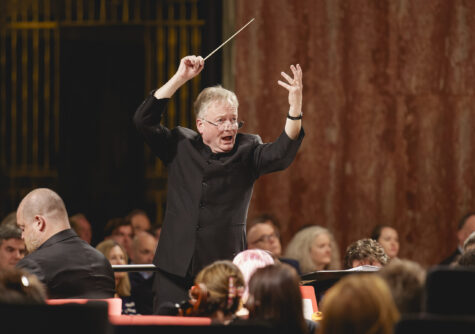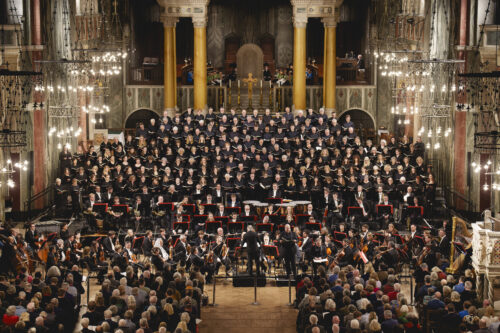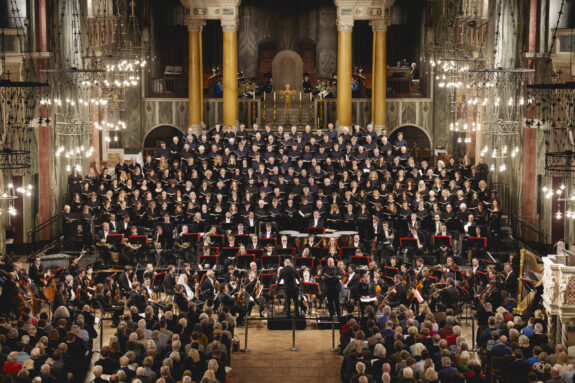 United Kingdom Britten’s War Requiem: Elizabeth Watts (soprano), Andrew Staples (tenor), Mark Stone (baritone), London Youth Choir – Junior Boys & Cambiata Boys, The Bach Choir, Philharmonia Orchestra / David Hill (conductor). Westminster Cathedral, London, 30.10.2024. (JR)
United Kingdom Britten’s War Requiem: Elizabeth Watts (soprano), Andrew Staples (tenor), Mark Stone (baritone), London Youth Choir – Junior Boys & Cambiata Boys, The Bach Choir, Philharmonia Orchestra / David Hill (conductor). Westminster Cathedral, London, 30.10.2024. (JR)

The Bach Choir has a special relationship with the War Requiem. It was The Bach Choir to whom Britten turned for the first London performance, and subsequent, much-admired John Culshaw recording for Decca; David Willcocks was then the Bach Choir’s Music Director. Britten had insisted the first performance should be held in the sacred setting of the rebuilt Coventry Cathedral; the London performance was at Westminster Abbey in December 1962. There were apparently acoustic drawbacks with both venues; and those drawbacks manifested themselves again at this performance, this time in Westminster Cathedral.
The War Requiem is a work which blends large choral and orchestral outbursts with intimate and poignant (often unaccompanied) solo settings of poems by Wilfred Owen, killed in action at the very end of World War I. Finding the right venue to present this masterpiece is no easy task – though in London I would venture to suggest that the Royal Festival Hall is nigh ideal.
It took some while for my ears to become accustomed to the reverberant (one could say woolly) sound of the chorus as their singing echoed around the cavernous and lofty cathedral; the sound tended to rise rather than project. I was seated near the front, and suspect the effect was much more pronounced at the back.

Let me turn to the many positives of this fine performance: first and foremost, the choir. To fill the space, one needs a large super-sized choir and The Bach Choir, with over well-drilled 200 singers, fits that bill. They sang superbly across all registers, plenty of volume and impact in the ‘Dies Irae’, and beautiful subtlety in quiet passages such as ‘Kyrie eleison’. Intonation, rhythmic vividness, fugal entries (such as the choir murmurings of ‘Pleni sunt coeli’) and diction were flawless. I very much liked the conductor’s idea at the very end of the work (‘Requiescant in pace’ – ‘Let them rest in peace’), the chorus raising their scores so only their eyes were visible.
The soloists were of the highest order. It took time for Andrew Staples to settle to the acoustic, it was difficult to hear his words in his opening ‘What passing bells’, but he increased his projection as the work progressed. Those unfortunates in the audience without a programme (which ought to have been free of charge) would have had no idea of the text. Mark Stone was impressive throughout, I just wished David Hill had chosen a German singer for added poignancy in the duets. Placing soprano Elizabeth Watts in the pulpit, right next to the front block of seats, was a masterstroke: it worked very well, and Watts sang superbly. She could watch the conductor from behind and timed her soaring high notes and entries to perfection. The soloists almost brought tears to the eyes as one’s thoughts turned inevitably to current conflicts.
The boys’ choir was placed high up in the Apse and invisible, just as the composer had originally directed. They had a few timing problems at first, but soon settled and generally impressed. (I sang along, hopefully inaudibly to my neighbour, having been a member of the Highgate School Boys Choir in the 1960s – the choir used for the first performances and above-mentioned Decca recording – recently remastered and still considered the seminal recording today).
The Philharmonia Orchestra was on good form, with plenty of volume to fill the space. David Hill also conducted the chamber orchestra, just off to the side. The bells were notable: the orchestra used the ‘Forever Bells’: the Royal Liverpool Philharmonic purchased 14 real church bells in 2019 and hires them out to other orchestras – they made an audible impact at this performance. As did the huge organ sound from behind, which almost drowned out everything at its big moment for the day of wrath.
Sadly, the message of the War Requiem remains topical – the pity and fruitlessness of war. Wilfred Owen’s words or warning still go unheeded. This fine performance drove the message home effectively with emotional force.
John Rhodes
